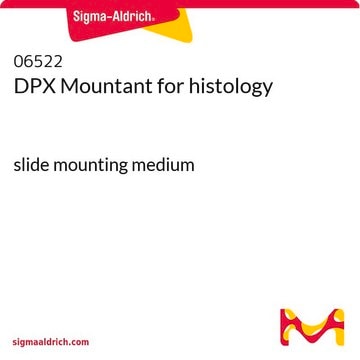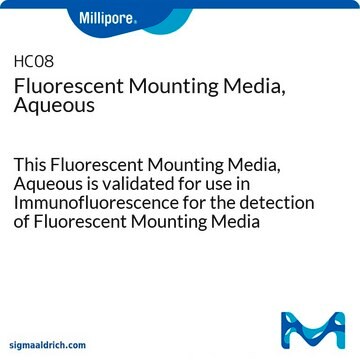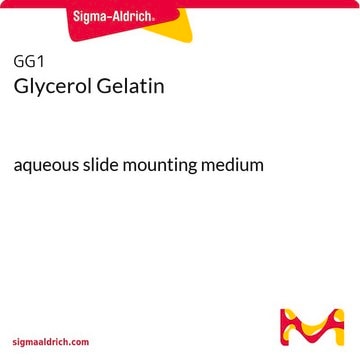1.07961
Entellan™ new
rapid mounting medium for microscopy
About This Item
Recommended Products
vapor pressure
<8 hPa ( 20 °C)
Quality Level
form
liquid
autoignition temp.
>250 °C
expl. lim.
1.1-8.0 % (v/v) xylene()
IVD
for in vitro diagnostic use
color
colorless
refractive index
n20/D 1.490-1.500
bp
137-143 °C/1013 hPa
transition temp
flash point 23 °C
density
0.95 g/cm3 at 20 °C
application(s)
diagnostic assay manufacturing
hematology
histology
storage temp.
15-25°C
General description
Refractive index (20°C) 1.490 - 1.500
Density (20°C / 4°C) 0.94 - 0.96 g/cm3
Viscosity (20°C) 250 - 600 mPa*s
Analysis Note
Density (d 20 °C/ 4 °C): 0.94 - 0.96
Fluorescence (as quinine at 365 nm): ≤ 250 ppb
Viscosity (20 °C): 250 - 600 mPa∙s
Suitability for microscopy: passes test
Legal Information
Signal Word
Danger
Hazard Statements
Precautionary Statements
Hazard Classifications
Acute Tox. 4 Dermal - Acute Tox. 4 Inhalation - Aquatic Chronic 3 - Asp. Tox. 1 - Eye Irrit. 2 - Flam. Liq. 3 - Skin Irrit. 2 - Skin Sens. 1 - STOT RE 2 Inhalation - STOT SE 3
Target Organs
Central nervous system,Liver,Kidney, Respiratory system
Storage Class Code
3 - Flammable liquids
WGK
WGK 3
Flash Point(F)
73.4 °F
Flash Point(C)
23 °C
Regulatory Listings
Regulatory Listings are mainly provided for chemical products. Only limited information can be provided here for non-chemical products. No entry means none of the components are listed. It is the user’s obligation to ensure the safe and legal use of the product.
PRTR
Class I Designated Chemical Substances
FSL
Group 4: Flammable liquids
Type 2 petroleums
Hazardous rank III
Water insoluble liquid
ISHL Indicated Name
Substances Subject to be Indicated Names
ISHL Notified Names
Substances Subject to be Notified Names
JAN Code
EC11079610100:
1079610100:
1079610500:
1079611000:
1079610000:
Certificates of Analysis (COA)
Search for Certificates of Analysis (COA) by entering the products Lot/Batch Number. Lot and Batch Numbers can be found on a product’s label following the words ‘Lot’ or ‘Batch’.
Already Own This Product?
Find documentation for the products that you have recently purchased in the Document Library.
Customers Also Viewed
Our team of scientists has experience in all areas of research including Life Science, Material Science, Chemical Synthesis, Chromatography, Analytical and many others.
Contact Technical Service













